Vietnam: The Unexpected Arabica Revolution
Endless rice fields, rolling hills, and warm weather – this is Vietnam, the country contributing nearly 20% of the world’s coffee supply. Primarily growing Robusta, coffee was introduced by French missionaries in the 19th century. It took another century for coffee to gain its well-known prominence today. Mercanta has been proudly purchasing a unique Vietnamese Arabica for the past 4 years and aim to continue supporting the hard work being conducted in this region.
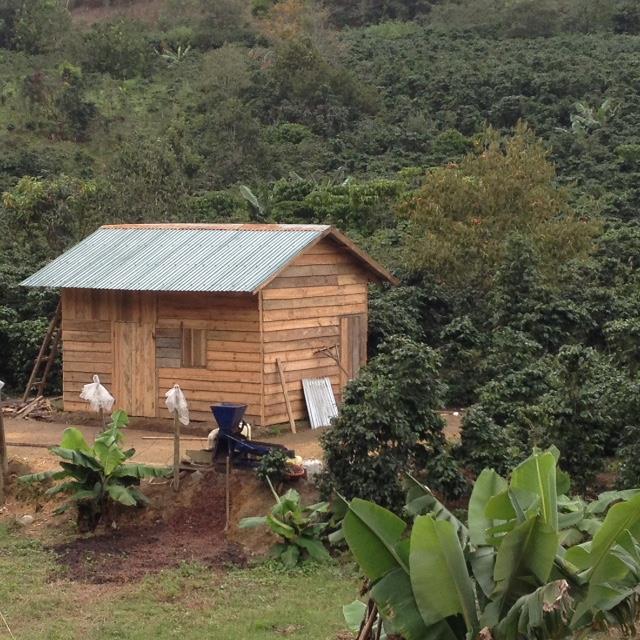
Arabica Farm, Dung K’No Village, Vietnam
The history of coffee production in Vietnam is complex and began with the construction of larger plantations in Phu Quy and Nghe An Provinces and within the Dak Lak and Lam Dong Provinces. Over time, coffee production spread throughout the highlands and thanks to economic reforms – more people were able to grow coffee to make a living. The coffee revolution in Vietnam is ongoing with plateuaing yields pushing producers to seek new methods to improve income and market access. In order to boost the economic well-being of producers, Mercanta has supported a specific project to provide producers with access to resources and premium markets.
Venture deep into the Central Highlands in Vietnam and you will find the Dung K’No village in the Lam Dong Province. This region is filled with towering mountains, low clouds, and vast expanses of pine trees. Nestled snug within the central mountains, this hidden gem of a village is home to a unique collection of Arabica farms, growing high-quality coffee amidst the usual sea of Robusta farms. This is a significant feat, considering Vietnam is a powerhouse Robusta producer. The smallholders in Dung K’No usually grow coffee on 2 hectares or less, on average. With only around 2,100 people in the village within 494 households – agriculture, coffee specifically, is the main source of income. Households will also grow rice, maize, banana, and persimmon to diversify income and provide a source of sustenance. The land provides many opportunities thanks to the cooler climates and moist atmosphere.
Conditions are ideal for Arabica – which is different compared to much of the other producing lowlands in Vietnam. With an average temperature of 20˚C and basalt soils – producers have the prime environment to cultivate Arabica coffee. Each producer invests great effort into their farms yet lack financial capacities to purchase fertilizers and agrochemicals. Without the necessary inputs, producers are more at risk to threats from pest and disease, in addition to nutrient deficiency. These producers care about quality and work to ensure the Arabica grown within these grassy hills shines brightly for customers such as Mercanta.
As it is widely known in the coffee industry – Vietnam is not somewhere producers trade directly with buyers. Middlemen have significant power over where coffee goes and how much is paid to producers. Thanks to the work conducted by ECOM, Mercanta’s partnering company in Asia, producers are more able to gain access to premium markets and participate in more direct trade. In 2011, ECOM also constructed a wet mill within the Lam Dong province – allowing producers to have their coffee processed directly and separately – thus improving processing techniques and traceability.
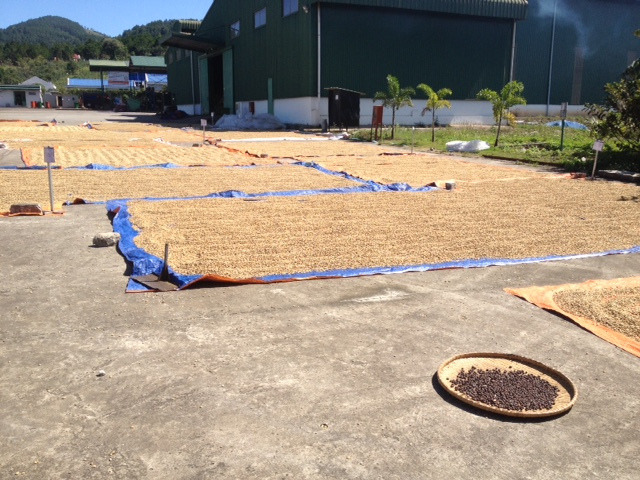
Arabica drying in the sun at the Dung K’No ECOM wet mill (Photo credit: Loc Cao)
Another benefit of ECOM’s involvement in this region led to the increased allocation of payment to each producer. This has been achieved via the direct sourcing model whereby coffee is directly purchased from the producer and remains traceable throughout the supply chain. Normally, the middlemen eat up a portion of the price, taking away the producers’ income for high-quality coffee. With an understanding that high quality coffee receives higher prices if traded more directly – producers began to revert to selling cherries directly to ECOM and began learning how to improve quality.
There is additional on-the-ground training from Sustainable Management Services (SMS), a network of agronomists and various other staff, working within ECOM, helping implement sustainable practices for producers throughout the world. In Dung K’No, SMS initiated an action plan to connect producers to better markets and resources and are now in close connection with 4,000 producers, 1,500 of which are growing Arabica.
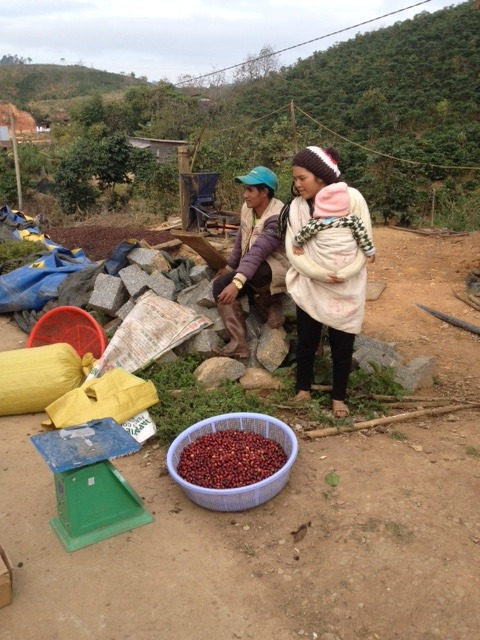
Ro Ong Ha Quoc and family learning about quality control from ECOM staff, Dung K’No (Photo credit: Loc Cao)
Working together, ECOM and SMS successfully distributed fertilizers to producers depending on their needs and financial hardships. In Vietnam, agrochemical usage is highly unregulated, which has led to counterfeit products being sold to consumers and a surplus of options for producers to select for production. This caused hardships for cultivation – with producers unable to completely understand what they were buying. SMS has thus initiated its “Crop Doctor” initiative to provide answers to producers in reference for these products. In addition to on-farm training, SMS has helped ensure producers are purchasing the best materials and understand how to use them efficiently.
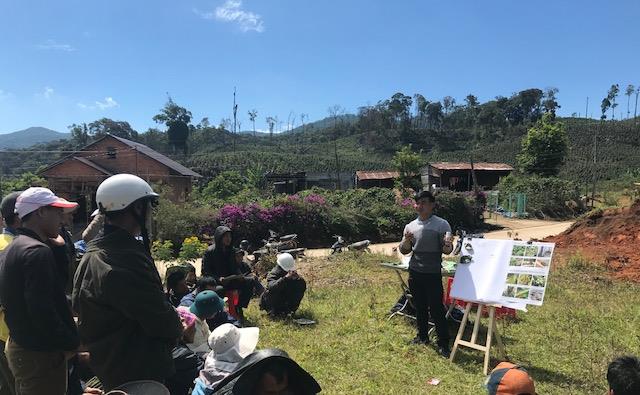
Field visit workshop on improved agricultural methods in Dung K’No, Vietnam
SMS has tailored educational systems to spread awareness to the Dung K’No producers about sustainable agricultural practices whilst also allocating vital resources to each farm. Regular trainings and interventions are offered to provide producers with the opportunity to interact with other producers to learn from each other. Shade trees saplings are dispersed to each farm, and producers are taught that shade can act as an extra layer of protection for the coffee whilst also providing producers with another source of income. There are individualized programs catered to each producer, providing support for soils, for instance. Other scientists also supply guidance on understanding data analytics and how to perceive farm economics. Combined, the agronomic and economic advice and trainings contribute to the creation of a sustainable farming community, yielding social, monetary and environmental benefits.
-
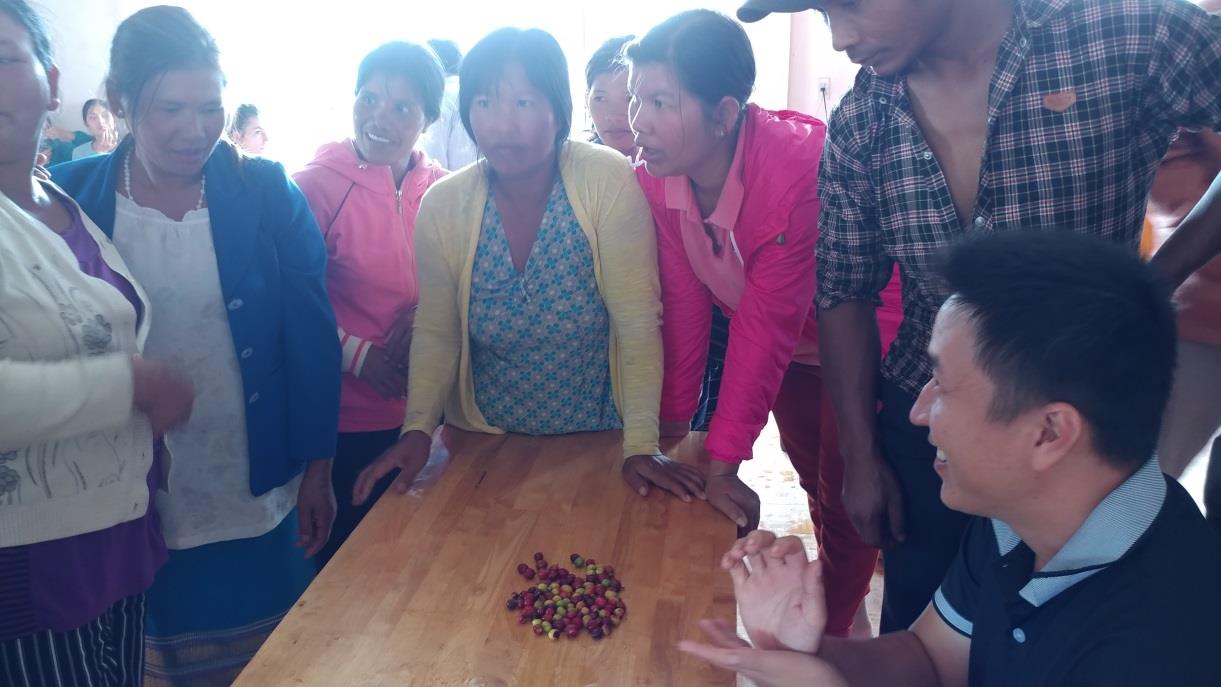
- Producers in Dung K’No receiving training on diseases and crop protection
-
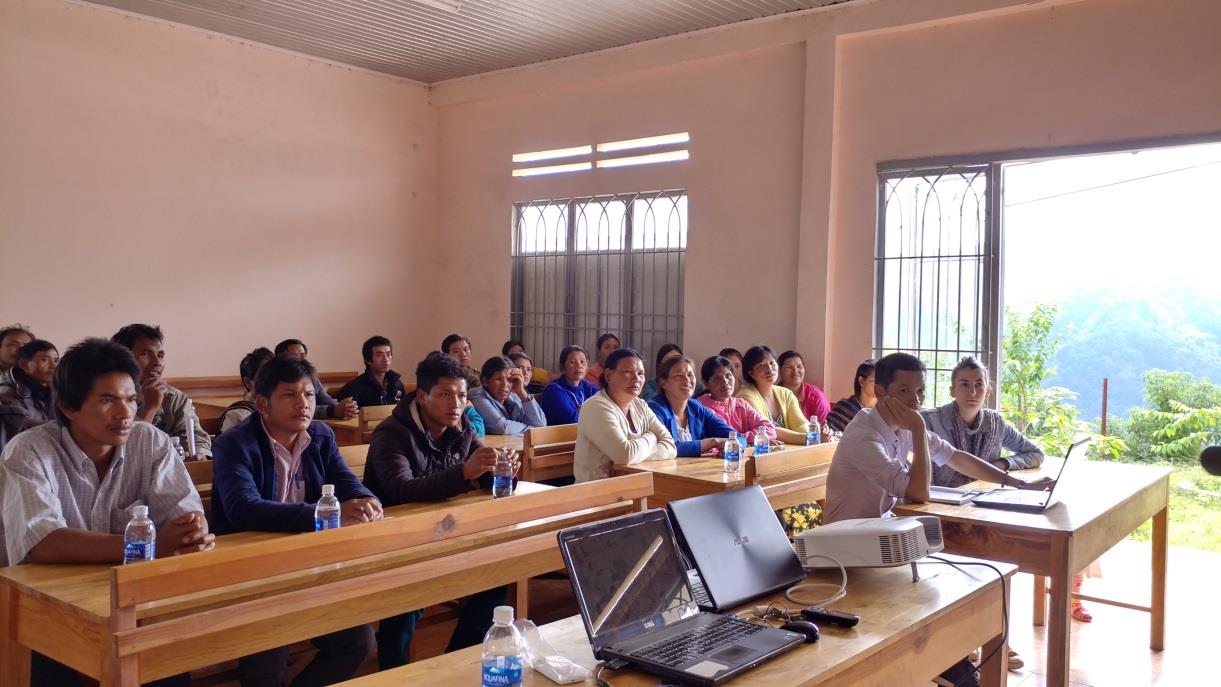
- Dung K’No producers learning about how to improve Arabica yields
All in all, with the two-pronged approach in this unique Arabica-producing region of Vietnam; ECOM and SMS have been able to support producers during cultivation via trainings, educational material, and access to various agricultural inputs. And, thanks to the creation of the direct sourcing model, producers are now more able to create a relationship with coffee buyers. Traceability is enhanced as coffees are processed and organized according to specific farm. Collectively, these positive changes contribute to the future of Arabica production in Vietnam.
Mercanta has been importing and distributing the coffees from Dung K’No throughout the UK and Europe – and we aim to purchase more over the next few years with hopes to continue spreading the coffee throughout Asia and the United States.